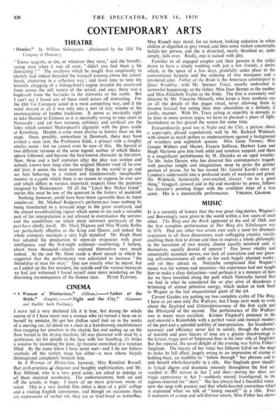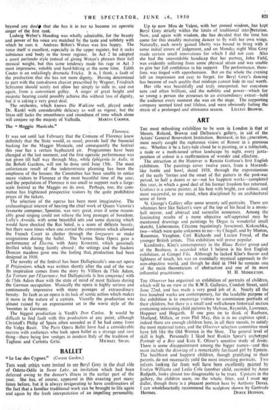MUSIC
IT is a curiosity of history that the two great ring-stories, Wagner's and Browning's, were given to the world within a few years of each other. The Ring and the Book appeared at the end of 1868, and the first complete performance of Der Ring des Nibelungen was in 1876 Had any other two artists ever such a need for dramatic expansion in all three dimensions, such unflagging creativc vitality enabling them first to divine and then to express a whole philosophy in the narration of two stories, almost equally involved and, in themselves, equally devoid of interest ? Our lower vitality and unnaturally tautened nerves, our lack of conviction and our gnaw- ing self-consciousness all unfit us for such hugely planned works ; and yet they attract us. Nietzsche complained that Wagner's music was for women and neurotics—his experience had not taught him to make a clear distinction—and perhaps it is a measure of how far we have travelled along the path which Nietzsche feared that we find in what he considered the ne plus ultra of decadence a brimming of almost piimitive energy, which makes us look back to Wagner as the last unquestioned giant of the art.
Covent Garden are putting on two complete cycles of The Ring. I have as yet seen only Die Walkure, but I hope next week to write about the Siegfried and Gentercliimmerung of the first cycle and the Rheingold of the second. The performance of Die Walkiire was in many ways excellent. Kirsten Flagstad's presence in the cast ensured a Briinnhilde with a perfect vocal and musical mastery of the part and a splendid nobility of interpretation. Set Svanholm's accuracy and efficiency never fail to satisfy, though the absence of warmth and pure beauty of tone are a greater disadvantage in the lyrical, tragic part of Siegmund than in his later role of Siegfried. But the especial, the novel delight of the evening was Sylvia Fisher's Sieglinde. The beauty of her voice has hitherto failed on the stage to make its full effect, largely owing to an impression of cramp or holding-back, an ,inability to " follow through " her phrases and to sink herself whole-heartedly in a role. Her Sieglinde grew steadily in lyrical chkrm and dramatic intensity throughout the first act, reached it fMll stature in Act 2 and then—during her short and tragic appearance in Act 3—suddenly soared, transfigured, to the regions reserved for " stars." She has always had a beautiful voice : now she sang with passion and that whole-hearted conviction which is expressed when we talk of " losing oneself " in a role. Even if moments of cramp and self-distrust return, Miss Fisher has shown beyond any dou* that she has it in her to become an operatic singer of the first rank.
Ludwig Weber's Hunding was wholly admirable, for the beauty and power of his voice are matched by the taste and subtlety with which he uses it. Andreas Bohm's Wotan, was less happy. The voice itself is excellent, especially in the upper register, but it tacks substance and body in the lower register. In Act 2 he adopted a quasi parlando style instead of giving Wotan's phrases their full musical weight, but this same tendency made his rage in Act 3 most impressive, voluble and hard-hitting at the same time. Edith Coates is an unfailingly dramatic Fricka. It is, I think, a fault of the production that she has not more dignity. Having determined to part with the ram-drawn chariot prescribed by Wagner, Friedrich Schramm should surely not allow her simply to sidle in, and out again, from a convenient gulley. A singer of great height and majestic bearing could possibly achieve this without loss of dignity, but it is asking a very great deal.
The orchestra, which knows Die Walkiire well, played under Dr. Rankl with considerable delicacy as well as vigour, but the brass still lacks the smoothness and roundness of tone which alone
will conjure up the majesty of Valhalla. " MARTIN COOPER.





































 Previous page
Previous page